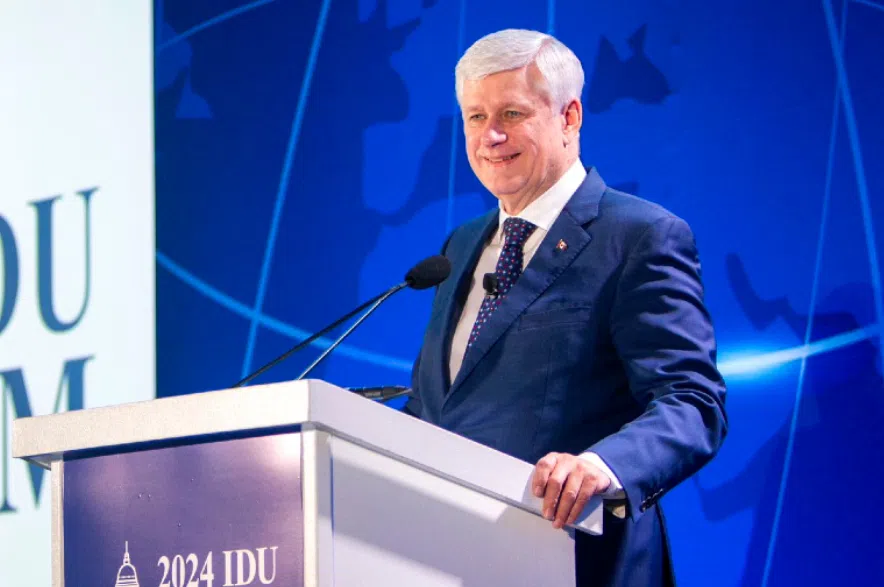Former Canadian prime minister Stephen Harper says U.S. President Donald Trump’s tariffs are a “wake up call” for the country to diversify its markets.
Harper made his remarks in an address at the Midwestern Legislative Conference at Saskatoon’s TCU Place, adding that he is concerned about the direction trade relationships are heading.
Read more:
- Questions surround Canada’s new business plan after breakup with the U.S.
- Carney says trade talks in ‘intense phase’ after Trump scores win with European Union
- As Trump’s trade deal deadline approaches, his tariffs face legal pushback
The event is an annual meeting for legislators from 11 midwestern states and four neighbouring Canadian provinces to discuss key issues affecting their jurisdictions, and Monday focused heavily on trade between the two countries.
“The idea of using tariff barriers to raise revenue and comprehensively relocate industries like this is a failed economic policy,” Harper said.
Harper said a short-term deal should be worked out with the Trump administration, but said Canada has relied too much on the United States for trade, with no good reason behind it.
“Just because we have that geographic proximity does not justify the degree of dependence that we have on a single market, which is sometimes disadvantageous” he said.
Harper said Canadian energy is vital to the United States, noting that certain parts of that country’s energy industry are dependent on its neighbours to the north.
He added that Canada has an abundance of resources such as potash, uranium, and critical minerals that he predicts the U.S. will be reliant on for the foreseeable future.
“Canada must be seized with the necessity of making sure that we do not export only to (the U.S.),” Harper said.
“We just cannot be in a position in the future where we can be threatened in this way and not have that leverage.”
Saskatchewan Premier Scott Moe said the province is the model to follow, as it is the least dependent by percentages on the United States as an export market.
Moe said while the U.S. is still the province’s biggest trading partner, only about 55 per cent of what Saskatchewan produces goes to the U.S.
“Saskatchewan is the highest per capita exporting region in North America, and we export to over 160 countries each and every year,” Moe said.
The premier said the province has focused on diversifying where its exports are going in the world over a number of years.
“I think moving forward we need to increasingly look at the fact that the U.S. is going to continue to be our largest trading partner, but we should not be dependent on that.”
Minnesota State Senator Mary Kunesh said there is some optimism that tariffs could be minimized or not put into effect, but she is not so confident herself.
“We don’t want to destroy the relationship that we have built,” she said.
“We hear a lot of angst coming down from up north, and want to make sure that Canadians know that we want to continue to have good relationships, good trade, and good tourism.”
Kunesh said Minnesota relies on potash for its fertilizer, and the ability to import or export from Canada is top of mind for farmers and the agricultural community in the state.
“I’m worried, I’m not going to lie, but I’m hoping at some point we’ll be able to do the repairs that are necessary.”
Read more:











